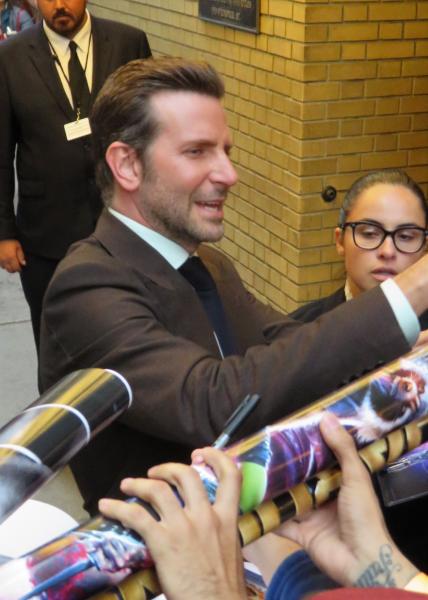SPOILER ALERT: A key theme in the movie will be revealed in this article.
Bradley Cooper’s directorial debut, A Star Is Born, featuring himself and Lady Gaga is receiving critical acclaim, early Academy Award buzz and international mega-success. That said, the Chief Censor in New Zealand, who is in charge of stratifying movie rankings, just uprated the film adding a specific warning to moviegoers that it contains suicide in its content. He felt compelled to do so after complaints, in particular from the Mental Health Foundation and Police Victim Support team, were raised that it “severely triggered” some viewers.
Here is the announcement:

Some background
The tale about a famous, talented musician (Cooper) and the ingénue (Gaga) he falls for aptly details in great depth the trials and tribulations of addiction, multi-drug abuse, depression, anxiety, codependency, dysfunction, love and the importance of mental health. It does so in a compelling, sensitive and worthwhile manner that is quite informative and could pose as an invaluable opportunity for the public to start a critical dialogue. It is an important reminder of the profound suffering of those challenged in this arena, and the struggles shared by their loved ones. I previously wrote about it on World Health Day because the iconic movie remake strikes a chord as it genuinely and accurately captures the reverberating heartache associated with the many internal demons we all often battle to some degree or another (read more here).
The controversy
I had the opportunity to be interviewed by nationwide Auckland-based RadioLIVE in New Zealand on the topic of the film, mental health in general, the current trigger warning controversy, suicide and the importance of reducing stigma surrounding these topics. To listen to the interview, go to this link (scroll down to the second story “Film Warning Spoiler Alert” and click on the play arrow on the bar below Lady Gaga’s picture).
The main narrative in the public domain, with respect to the Chief Censor, is the notion that suicide is unexpected in the storyline and viewers should be able to know in advance if they do or don’t want to be surprised by it - so as to make an “informed choice.” It also appears the film rating system there has several more categories than the U.S. one to alert audiences of impending content, which is obviously relevant to families everywhere when deciding what children or teens may or may not be mature enough to handle.
Clearly, this updated uprating and warning alert for this film is well-intended. But, like many policies, it is often misguided. Per media reports, the complaints received by the overseeing bodies that prompted the change included contact of support services by “two vulnerable young people” who “had been 'severely triggered' by the movie” and the other “had received dozens of complaints about the movie and most were around the fact that viewers weren't warned there were significant suicide scenes in the movie” (read here).
I would argue the complaints mental health service organizations received upon viewing the film are actually welcomed news. For those so distressed to the point of taking such action, they are likely at high risk and with mental health issues, depression etc the stakes with respect to suicide are very high. These individuals could actually represent a missed opportunity to intervene for help had they not seen the movie. And the loss of that narrow window to save a life is an irreversible one.
The movie may very well have performed an invaluable public service in these instances.
Adding “suicide” to this film warning doesn’t bother me, it just should be addressed in concert with the reality that the unexpected is always a part of life - inside or outside of the film genre. Controlling experiencing any anxiety from seeing things we prefer not to see by forcibly sanitizing all avenues does not prepare us for when untoward moments we cannot control arise. The daily television news and social media viral images are often worse than any fictional account. Don’t forget, even The Lion King makes death a theme.
Societal emphasis needs to be on cultivating resilience, coping capacity and adaptability should life’s obstacles enter our path. And they will for us all, in a varied spectrum at different stages of development.
Encountering unpleasant moments is an aspect of a full life. How we react and navigate those situations is crucial to whether they have a transient or lasting impact. More importantly, we need to add back into common discourse the fact that people can experience minor to even more substantial trauma and still be okay. People are often less fragile than we realize. Raising and empowering young people with the fortitude to encounter something upsetting, learn how to talk about and manage their response with a goal of reframing it as an opportunity for continued growth and learning will pay the greatest dividends.
It is also imperative that parenting not be outsourced regardless of warning levels. Each child is different. Some have great maturity that warrants encouragement of autonomy. Others require some training wheels for a more extended period of time. No matter what the activity, movie or otherwise, a governing body will never make for a purposeful substitute for an involved parent, family or loved one. A general guide, yes. But, never a replacement.
####
The National Suicide Prevention Lifeline provides 24/7, free and confidential support for people in distress, prevention and crisis resources for you or your loved ones, and best practices for professionals: 1-800-273-8255




